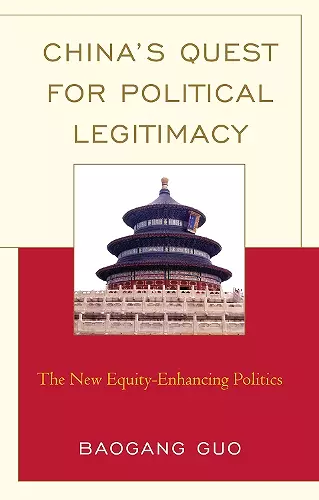China's Quest for Political Legitimacy
The New Equity-Enhancing Politics
Format:Hardback
Publisher:Lexington Books
Published:23rd Sep '10
Currently unavailable, and unfortunately no date known when it will be back

This book examines the new equity-enhancing politics in China in the context of Chinese traditional cognitive patterns of political legitimacy and its implication for Chinese political development in the near future. Based on an analysis of the new governing philosophy, the generation of political elite, and a new set of public policies, the book reaffirms the emergence of a new Chinese polity that infuses one-party rule with limited electoral and deliberative democracies. Unlike many scholars who perceive the contemporary Chinese history as a constant search for democracy, this book takes a very different approach. It asserts that the enduring question in political development in China today is no different from what was sought after throughout Chinese history, namely, the constant search for political legitimacy. Even though the quest for democracy is instrumental to that end, it may not ultimately lead to the embrace of a full-fledged liberal democracy. The new politics is not only a rationalization of the efficiency-based development, but also a major paradigm shift in China's developmental strategy.
China's Quest for Political Legitimacy fills a much needed niche with its analysis of the post-Deng period. This thoughtful study is timely as China grapples with the social consequences and economic spillovers of rapid growth. In economics, the trade-off between efficiency that allows growth, and the equity distribution of the benefits of that growth, are well known. Professor Guo creatively applies these concepts to analyze the current leadership's overarching strategy of harmonious society andscientific development. By explaining the new politics of equity with examples from health care, environment and labor, Professor Guo lays the groundwork for one approach to understanding the building of a new political legitimacy. Growth is necessaryfor progress in China, but the building of institutions of modern society needs to also occur. Professor Guo takes this one step further-arguing that a new approach is needed for sustained economic progress but also for the continued legitimacy of the governing party and state. The post-Deng leadership has based its future on success in the equity realm but faces many challenges in moving to the next stage of modernization. This thoughtful study is timely as China grapples with the social consequence -- Penelope Prime, Director, China Research Center, Mercer University
This study is an important contribution that will enhance our understanding of Chinese politics. It should find a wide audience as it will appeal to practitioners, academics and anyone with an interest in China. -- Dennis V. Hickey, Missouri State University
China's Quest for Political Legitimacy fills a much needed niche with its analysis of the post-Deng period. This thoughtful study is timely as China grapples with the social consequences and economic spillovers of rapid growth. In economics, the trade-off between efficiency that allows growth, and the equity distribution of the benefits of that growth, are well known. Professor Guo creatively applies these concepts to analyze the current leadership's overarching strategy of "harmonious society" and "scientific development." By explaining the "new politics of equity" with examples from health care, environment and labor, Professor Guo lays the groundwork for one approach to understanding the building of a new political legitimacy. Growth is necessary for progress in China, but the building of institutions of modern society needs to also occur. Professor Guo takes this one step further-arguing that a new approach is needed for sustained economic progress but also for the continued legitimacy of the governing party and state. The post-Deng leadership has based its future on success in the equity realm but faces many challenges in moving to the next stage of modernization. This thoughtful study is timely as China grapples with the social consequences and economic spillovers of rapid growth. By explaining the "new politics of equity" with examples from health care, environment and labor, Professor Guo lays the groundwork for one approach to understanding the building of a new political legitimacy. The post-Deng leadership has based its future on success in the equity realm but faces many challenges in moving to the next stage of modernization. Professor Guo creatively applies concepts of efficiency and equity to analyze China's leadership's overarching strategy of "harmonious society" and "scientific development." By explaining the "new politics of equity" with examples from health care, environment and labor, Professor Guo lays the groundwork for one approach to understanding the building of a new p -- Penelope Prime, Director, China Research Center, Mercer University
Guo (Dalton State College) draws on empirical, historical, and cultural sources to argue that the political leadership in China's single-party system is seeking to promote a "new politics of equity" keyed to the country's rapid economic advance. The author sees this agenda as requiring a "new political legitimacy" affixed to the authoritarian framework—an innovation allowing for limited electoral and deliberative democracy. The book is useful mostly for the light it sheds on the health care, environment, and labor policy sectors. Readers may wonder where democracy in China is and whether there is potential for a meaningful democratic evolution. The tables and selected bibliography are useful. Graduate, research, and professional collections. -- June 2011 * CHOICE *
ISBN: 9780739122587
Dimensions: 243mm x 162mm x 21mm
Weight: 515g
234 pages